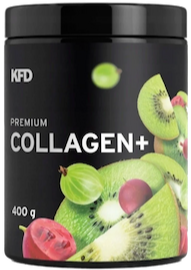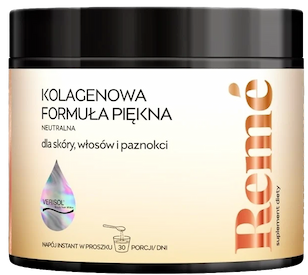How much collagen per day in mg should I take? Dosage tips
Find out how much collagen to supplement daily to see results.


Learn more about our editorial process
.

Learn more about our editorial process
.

Learn more about our editorial process
.

Learn more about our editorial process
.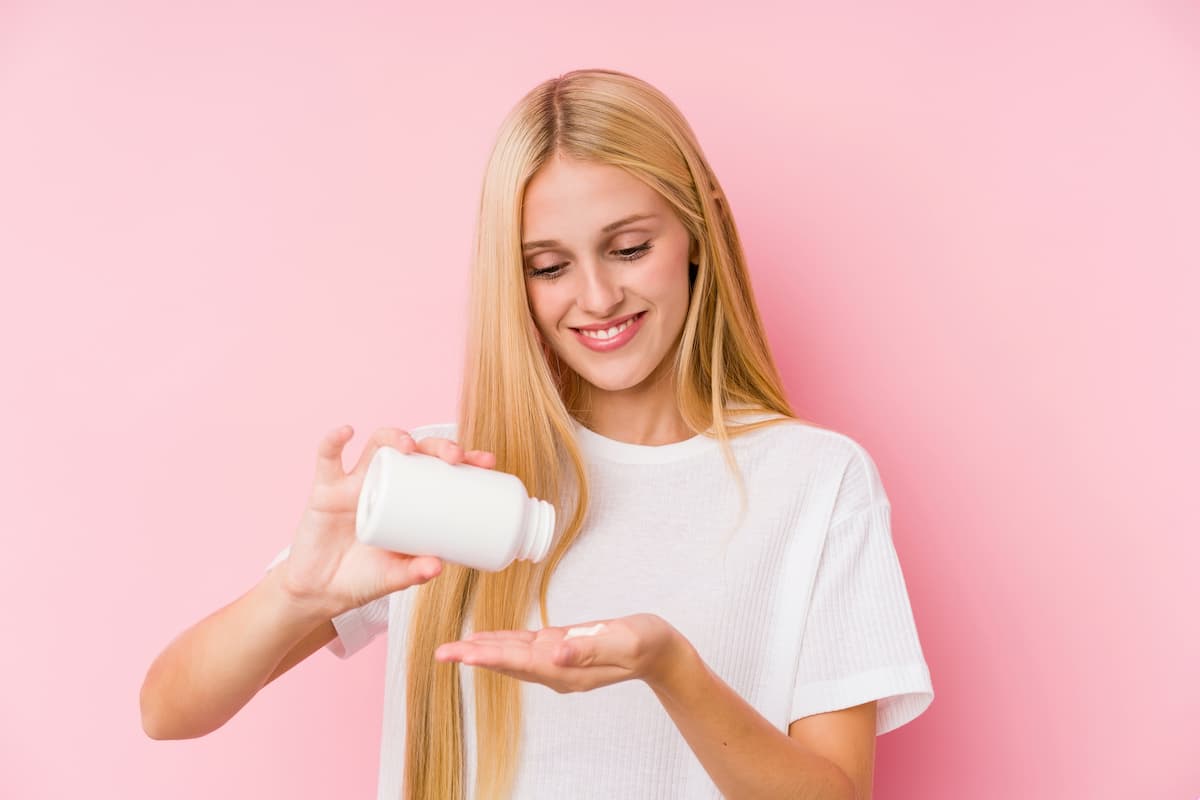
Why you can trust us
Articles on Natu.Care are written based on scientific research, data from government websites and other reliable sources. The texts are written in cooperation with doctors, nutritionists and other health and beauty experts. Articles are reviewed before publication and during significant updates.
.Learn more about our editorial process
.Information about advertisements
Content on Natu.Care may contain links to products from the sale of which we may receive a commission. When creating content, we adhere to high editorial standards and take care to be objective about the products discussed. The presence of affiliate links is not dictated by our partners, and we select the products we review ourselves completely independently.
.Learn more about our terms and Conditions
.Helps skin, hair nails, joints and much more. Yes, we're talking about collagen, and it can indeed support all of these elements, but... Well, that's just it, but you need to take care with the right dosage.
Even the best-absorbed collagen will not have the desired effect if there is simply not enough of it. That is why, together with clinical nutritionist Julia Skrajda we will tell you how much collagen to take on a daily basis.
The following is a guide.
From this article, you will learn:
- How much collagen to supplement per day.
- How much collagen to supplement.
- Whether recommendations vary depending on expectations.
- Do you need to take more beef collagen than fish collagen.
- Whether you need to take more collagen than fish collagen.
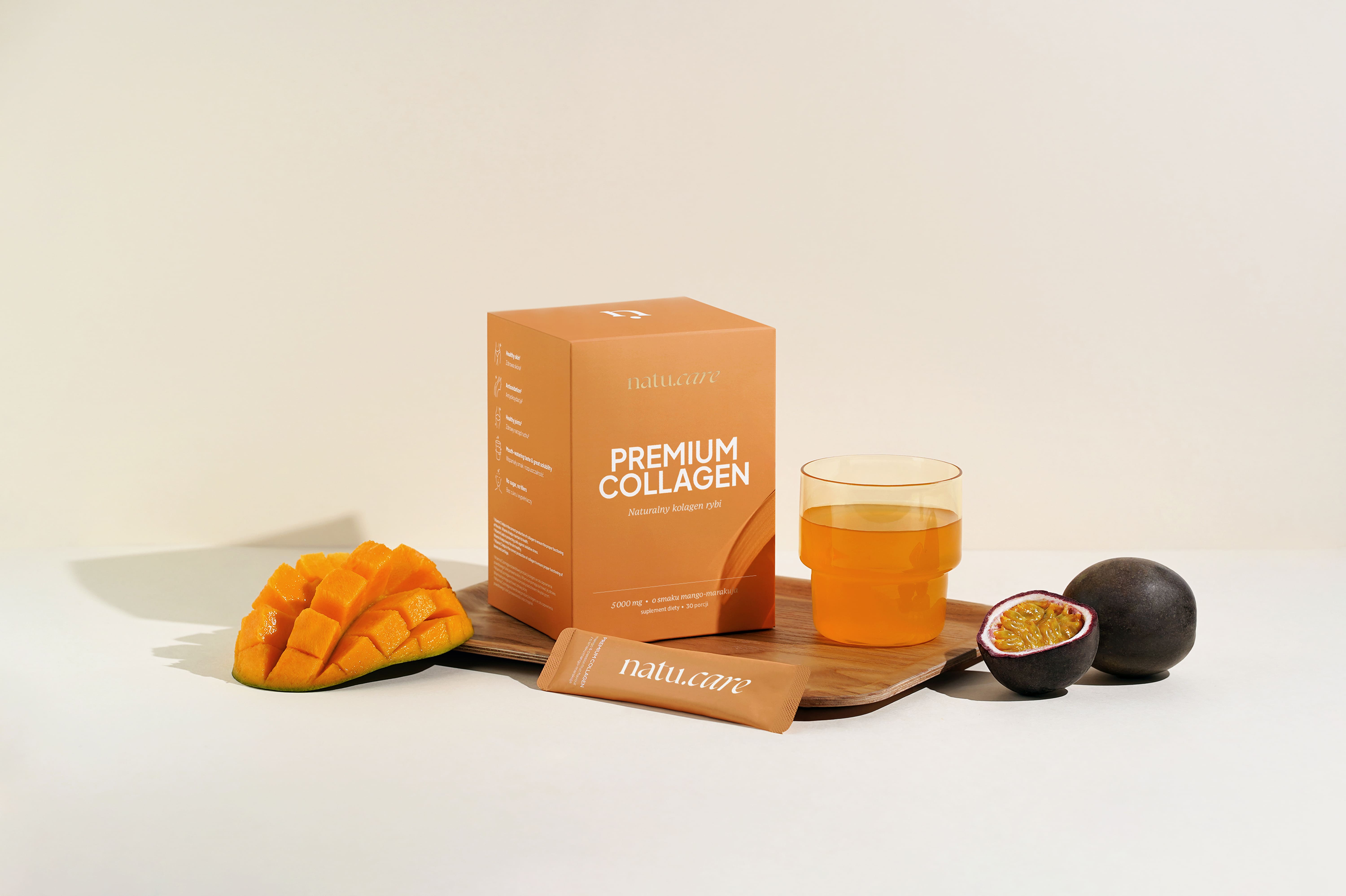
Sprawdź, za co pokochały go tysiące klientek Kolagen Premium 5000 mg, mango-marakuja
Natu.Care Kolagen Premium 5000 mg, mango-marakuja
Natu.Care Kolagen Premium dla zdrowia stawów, skóry, paznokci i włosów. Najlepsza przyswajalność. Optymalna dawka 5 000 lub 10 000 mg. Przebadany przez niezależne laboratorium.
Zobacz więcej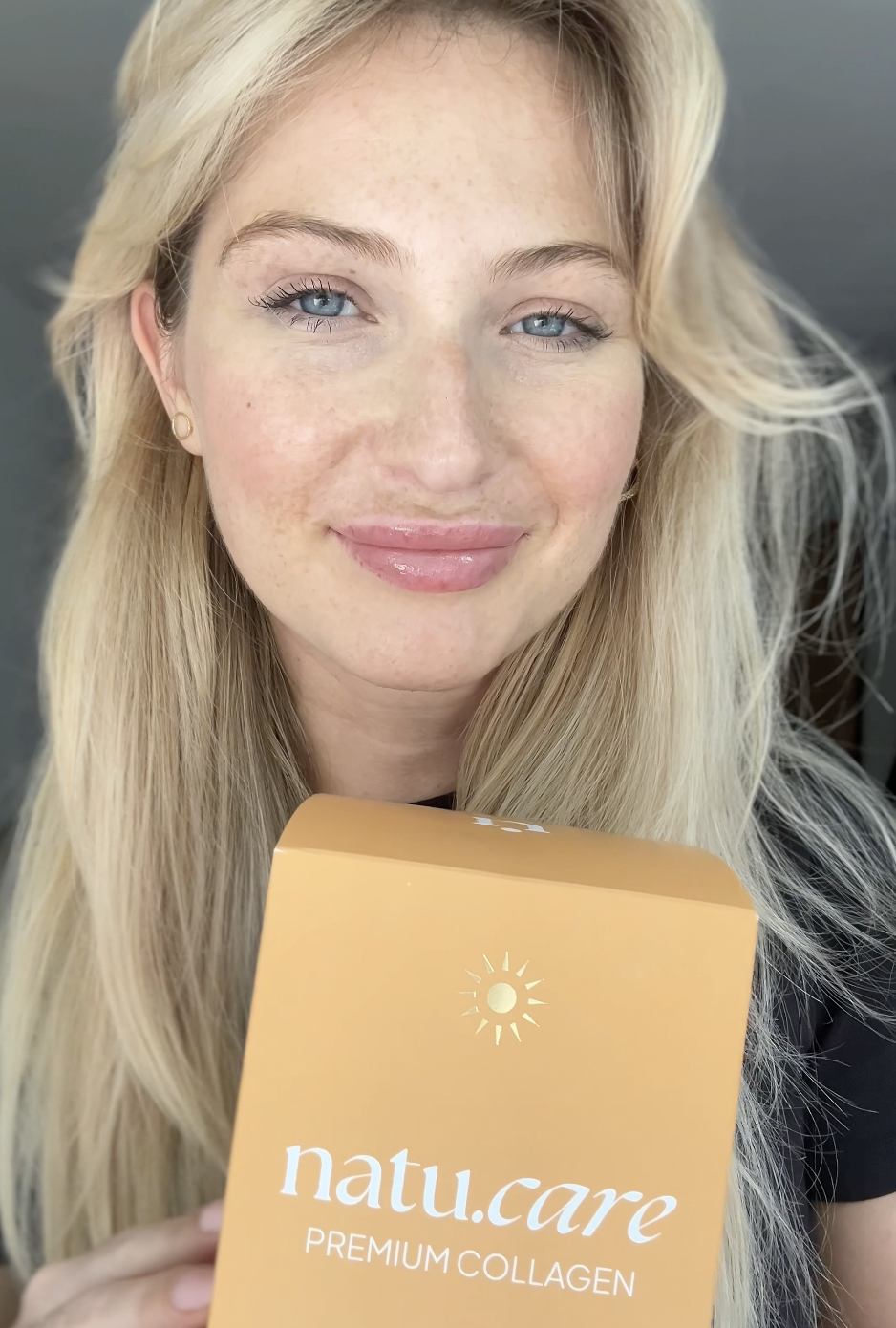
Wybrałam kolagen Natu.Care, ponieważ miał super opinie – a to było dla mnie bardzo ważne! Odkąd go stosuję, moja skóra znacznie się poprawiła i jest nawilżona, a na głowie pojawiły się nowe "baby hair".@Kasia S.
See also:
- The best collagen on the market
- Best collagen for nails
- Best collagen for face
- Best collagen for wrinkles
- Best collagen for skin
- Best collagen for joints
- Best collagen for hair
- Best collagen for cellulite
- Best collagen for acne
- Best collagen for stretch marks
- Best collagen for scars
- Best collagen for bones
- Best collagen for drinking and collagen for drinking (effects)
How much collagen to supplement daily?
Supplement approximately 2,500 to 15,000 mg collagen hydrolysate per day (2.5-15 g). These doses have been studied, and research suggests, that they can produce good results for skin, hair, nails and joints. Smaller portions can also support these elements, but it will usually take longer and the effects may be less noticeableand.
Another strand in the aforementioned study says, that collagen peptides can make up about 36% of your daily protein needs. How much protein you need depends on your age, body weight and lifestyle. The proverbial Smith who weighs 75kg should take in about 60 grams of protein per dayand.
So we can easily calculate that 36% of 60 grams is exactly 21.6 grams of collagen per day. Is this even possible? Probably yes - combining the most powerful collagen supplements with a proper diet can provide you with around 20 grams of collagen per day. Keep in mind, however, that there is a lack of research focusing on the effects of taking such high doses.
What's more, supplements that provide only 300 mg (yes, mg) of collagen in combination with other ingredients can have effects on, for example, hair. But about that in the next section.
What is the daily dose of collagen for joints, skin, hair and nails?
The general dosage of collagen is quite broad. However, some studies have examined the effects of specific doses on specific elements of the body.
Dosing of collagen on the skin
The first was a meta-analysis of studies conducted on a total of 1125 participants (95% of whom were women) aged 20-70 years. Under the microscope was hydrolysed fish collagen at a dose of 2,500 mgand.
After 90 days of regular supplementation, participants noticed an improvement in the appearance and tone of their skin. What's more, under the magnifying glass (now literally) the participants' skin density was taken by the researchers - it too improved.
Another study tested the effect of collagen on skin dryness. This test involved more than 1,000 people who chose to take 5,000 mg of collagen daily. After 12 weeks, the participants' skin was more hydrated and again the density improvedand.
See also:
- Collagen for the skin
- Facial collagen
- Collagen for wrinkles
- Collagen for cellulite
- Collagen for stretch marks
- Collagen for acne
- Collagen for scars
How many mg of collagen per day for joints?
One study tested the effects of hydrolysed collagen on patients with primary knee osteoarthritis. It involved 250 participants who received 10 grams of collagen hydrolysate daily for 6 monthsand.
Patients' condition improved and knee joint comfort increased significantly. The effects were best in patients with the worst joint condition (at the start of the study) and in those whose dietary intake protein was lowest.
Another study tested the effect of 40 mg of undenatured type II collagen produced from chicken sternum cartilage on relieving symptoms in people with osteoarthritis. After 180 days, the supplement not only relieved the symptoms of the affected knee joint, but was also well tolerated. The study involved 191 patientsand.
See also:
- Collagen for joints
- Collagen for tennis elbow
- Collagen for tendons
- Collagen for runners
- Collagen for bones
- Collagen for athletes
Daily dose of collagen for hair
Clinical studies that test specific doses of collagen for hair are still lacking. However, one has tested the effects of 300 mg of fish collagen in combination with taurine, cysteine, methionine, iron and selenium. The 12-week study involved 83 participants (26 men and 57 women) suffering from excessive hair lossand.
Participants were divided into group A (48 people), which received supplementation and drug treatment, and group B (35 people), which received drug treatment only. The results after six weeks showed higher efficacy in group A compared to group B, and after 12 weeks the difference was even greater.
The supplement was well tolerated, and the study itself suggests that an oral formulation containing fish collagen, taurine, cysteine, methionine, iron and selenium improves the efficacy of specific hair loss medications.
Note
Remember that in the above study, patients were also given additional ingredients that reduce hair loss.
The extent to which collagen is absorbed is influenced by the condition of the digestive system and overall health. Therefore, it is always worth ensuring a balanced diet and compensating for other nutritional deficiencies so that collagen supplementation is more effective. The better the state of the digestive system, the tightness of the intestinal and gastric membranes, the less collagen supplement we will "escape" from the body.

Julia SkrajdaDietitian
What dose of collagen for nails?
A 2017 study examined the effects of collagen on nails. A group of women aged 25-50 took part in the test. For six months, the participants supplemented 2500 mg collagen peptides per day. The effects wereand:
- 42% less incidence of nail breakage.
- 12% higher rate of nail growth.
- 80% of participants admitted that the collagen improved the condition of their nails and that they were satisfied with the result.
Additionally, women noticed fewer irregular edges on their nails, which also positively affected their appearance.
How much fish, beef and pork collagen per day?
The source of collagen does not affect dosage. Whether you take beef collagen, fish collagen or pork collagen, it is recommended that a daily serving should be in the range of 2.5-15 grams.
Research suggests, however, that sea collagen is absorbed up to 50% better than beef or pork collagen. So on paper by taking even less fish collagen than pork or beef collagen, you may be providing greater benefitsand.
This is purely speculation, however, and in the studies we are talking about bioavailability up to 50% better, so it is not always constant.
In brief
Collagen source has no effect on dosage.
Best collagen supplements - ranking
Natu.Care Collagen Premium 5000 mg, mango-maracuja

- Collagen content: 5000 mg marine collagen hydrolysate
- .
- Additional active ingredients: vitamin C, low molecular weight hyaluronic acid (and L-theanine and coenzyme Q10 in cocoa flavoured collagen or vitamin A and vitamin E in mango–passion fruit flavoured collagen)
- .
- Form: powder sachets
- .
- Dose: 1 sachet per day
- .
- Sufficient for: 30 days
- .
Product description
Fish collagen from the Natu.Care brand in a dose of 5000 mg. The formula contains a sufficient portion of the active substance to positively affect your joints, musculoskeletal system and immunity.
Take care of your tendons, joint cartilage, ligaments, muscles and even bones by supplying them with the building blocks to function properly. Move without bólu and provide the necessary support for any physical activity.
And as a „gratis” to regular supplementation, you will also receive firm skinóhand, healthy and shiny hair and strong nails.
Natu.Care Premium Collagen is available in two flavours – Cacao Bloom and Rise&Shine. Both formulas are based on the following active ingredients: marine collagen hydrolysate, wild roseóbud extract and hyaluronic acid.
Additionally, Cacao Bloom contains natural L-theanine, coenzyme Q10 and defatted Dutch cacao. Rise&Shine instead contains vitamin E and vitamin A.
These are the best collagens in the world.
These best fish collagens on the market also rós taste – Cacao Bloom is a treat for chocolate lovers. Rise&Shine will appeal to those whoóenjoy the refreshing taste of mangoófruit and passion fruit.
Pros and cons
Fish collagen from the Natu.Care brand in a dose of 5000 mg. The formula contains a sufficient portion of the active substance to positively affect your joints, musculoskeletal system and immunity.
Take care of your tendons, joint cartilage, ligaments, muscles and even bones by supplying them with the building blocks to function properly. Move without bólu and provide the necessary support for any physical activity.
And as a „gratis” to regular supplementation, you will also receive firm skinóhand, healthy and shiny hair and strong nails.
Natu.Care Premium Collagen is available in two flavours – Cacao Bloom and Rise&Shine. Both formulas are based on the following active ingredients: marine collagen hydrolysate, wild roseóbud extract and hyaluronic acid.
Additionally, Cacao Bloom contains natural L-theanine, coenzyme Q10 and defatted Dutch cacao. Rise&Shine instead contains vitamin E and vitamin A.
These are the best collagens in the world.
These best fish collagens on the market also rós taste – Cacao Bloom is a treat for chocolate lovers. Rise&Shine will appeal to those whoóenjoy the refreshing taste of mangoófruit and passion fruit.
Additional information
Fish collagen from the Natu.Care brand in a dose of 5000 mg. The formula contains a sufficient portion of the active substance to positively affect your joints, musculoskeletal system and immunity.
Take care of your tendons, joint cartilage, ligaments, muscles and even bones by supplying them with the building blocks to function properly. Move without bólu and provide the necessary support for any physical activity.
And as a „gratis” to regular supplementation, you will also receive firm skinóhand, healthy and shiny hair and strong nails.
Natu.Care Premium Collagen is available in two flavours – Cacao Bloom and Rise&Shine. Both formulas are based on the following active ingredients: marine collagen hydrolysate, wild roseóbud extract and hyaluronic acid.
Additionally, Cacao Bloom contains natural L-theanine, coenzyme Q10 and defatted Dutch cacao. Rise&Shine instead contains vitamin E and vitamin A.
These are the best collagens in the world.
These best fish collagens on the market also rós taste – Cacao Bloom is a treat for chocolate lovers. Rise&Shine will appeal to those whoóenjoy the refreshing taste of mangoófruit and passion fruit.
User review
Fish collagen from the Natu.Care brand in a dose of 5000 mg. The formula contains a sufficient portion of the active substance to positively affect your joints, musculoskeletal system and immunity.
Take care of your tendons, joint cartilage, ligaments, muscles and even bones by supplying them with the building blocks to function properly. Move without bólu and provide the necessary support for any physical activity.
And as a „gratis” to regular supplementation, you will also receive firm skinóhand, healthy and shiny hair and strong nails.
Natu.Care Premium Collagen is available in two flavours – Cacao Bloom and Rise&Shine. Both formulas are based on the following active ingredients: marine collagen hydrolysate, wild roseóbud extract and hyaluronic acid.
Additionally, Cacao Bloom contains natural L-theanine, coenzyme Q10 and defatted Dutch cacao. Rise&Shine instead contains vitamin E and vitamin A.
These are the best collagens in the world.
These best fish collagens on the market also rós taste – Cacao Bloom is a treat for chocolate lovers. Rise&Shine will appeal to those whoóenjoy the refreshing taste of mangoófruit and passion fruit.
Natu.Care Collagen Premium 10000 mg, cherry

- Collagen content: 10,000 mg of hydrolyzed bovine collagen
- Additional active ingredients: vitamin C, low molecular weight hyaluronic acid, glucosamine, chondroitin, extract of Indian frankincense resin (boswellia serrata)
- Form: powder sachets for drinking
- Serving: 1 sachet per day
- Lasts for: 30 days
Product description
One of the strongest collagens on the market, providing as much as 10,000 mg per daily serving. This product can effectively support the condition of joints, skin, hair, and nails.
With this supplement, you will support your skeletal and joint system as well as your beauty, helping you visually halt the aging process and feel rejuvenated!
Pros and cons
Pros:
- The daily portion of collagen is very large – as much as 10,000 mg.
- Proven collagen formula – COLLinstant, whose effectiveness has been confirmed in clinical studies.
- Effective dose of hyaluronic acid, which additionally moisturizes the skin and positively affects joint health.
- Vitamin C supports the body's natural collagen production.
- Glucosamine is a fundamental building block of compounds found in joint cartilage and a component of collagen that gives elasticity to connective tissue in tendons.
- Chondroitin is a natural component found in the human body, mainly in cartilage. This large molecule (mucopolysaccharide) has the ability to absorb water, which helps maintain the elasticity and resilience of cartilage.
- Frankincense resin extract supports blood circulation and joint mobility and reduces their stiffness. It may help alleviate inflammatory conditions.
- The composition has been tested by the independent and accredited J.S. Hamilton laboratory.
Cons:
- None.
Additional information
Users praise Natu.Care Collagen Premium for the easy dissolving of the powder.
ALLDEYNN Collarose Fish
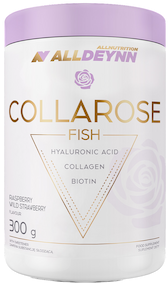
- Collagen content: 5000 mg hydrolysate fish collagen VERISOL F® .
- Additional active ingredients: vitamin C, hyaluronic acid, biotin
- Form: powder to dissolve in water .
- Dose: one scoop (6 g) of powder daily .
- Sufficient for: 50 days .
Product description
Atlantic cod collagen VERISOL F® contained in the formula are easily absorbed collagen peptides of fish origin. Regular supplementation can firm your skinóhand and slow down the ageing process. Your nails will become stronger and stop breaking. The addition of biotin will improve the condition of your hairów. The collagen portion is high enough to also have a good effect on your joints, muscles and bones.
Pros and cons
Atlantic cod collagen VERISOL F® contained in the formula are easily absorbed collagen peptides of fish origin. Regular supplementation can firm your skinóhand and slow down the ageing process. Your nails will become stronger and stop breaking. The addition of biotin will improve the condition of your hairów. The collagen portion is high enough to also have a good effect on your joints, muscles and bones.
Additional information
Atlantic cod collagen VERISOL F® contained in the formula are easily absorbed collagen peptides of fish origin. Regular supplementation can firm your skinóhand and slow down the ageing process. Your nails will become stronger and stop breaking. The addition of biotin will improve the condition of your hairów. The collagen portion is high enough to also have a good effect on your joints, muscles and bones.
Expert and user opinion
Atlantic cod collagen VERISOL F® contained in the formula are easily absorbed collagen peptides of fish origin. Regular supplementation can firm your skinóhand and slow down the ageing process. Your nails will become stronger and stop breaking. The addition of biotin will improve the condition of your hairów. The collagen portion is high enough to also have a good effect on your joints, muscles and bones.
DuoLife Collagen fish collagen 2500 mg
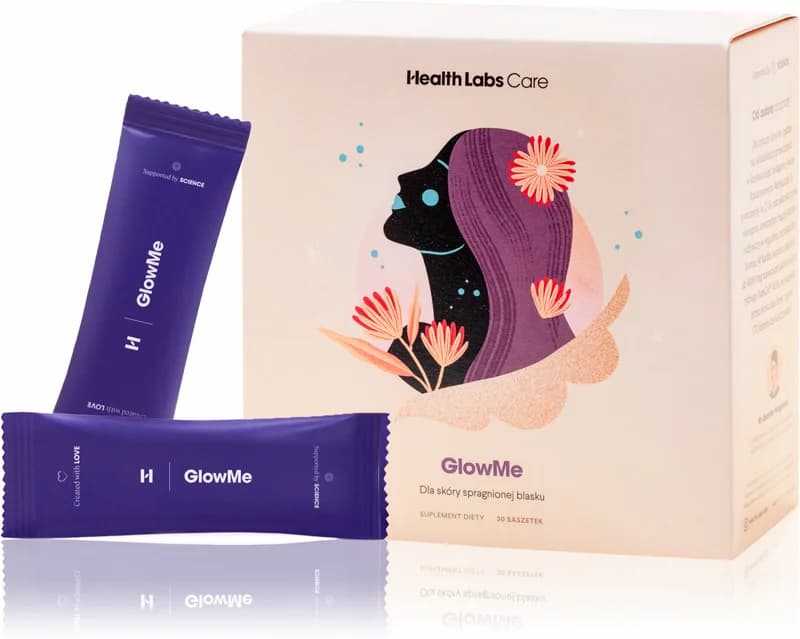
- Collagen content: 2500 mg collagen
- Additional active ingredients: vitamin C, silicon, glucosamine, hyaluronic acid, nettle and bamboo extracts
- Form: liquid to drink .
- Dose:25 ml .
- Sufficient for: 30 days .
Product description
100% natural collagen liquid without unnecessary ingredientsós. The composition of ingredientsós improves the appearance and condition of skinóry, hairów, nails. DuoLife is a good choiceór if you notice the first signs of skinóry ageing or want to stop this process. A tasty liquid, convenient to use.
Pros and cons
100% natural collagen liquid without unnecessary ingredientsós. The composition of ingredientsós improves the appearance and condition of skinóry, hairów, nails. DuoLife is a good choiceór if you notice the first signs of skinóry ageing or want to stop this process. A tasty liquid, convenient to use.
Additional information
100% natural collagen liquid without unnecessary ingredientsós. The composition of ingredientsós improves the appearance and condition of skinóry, hairów, nails. DuoLife is a good choiceór if you notice the first signs of skinóry ageing or want to stop this process. A tasty liquid, convenient to use.
User review
100% natural collagen liquid without unnecessary ingredientsós. The composition of ingredientsós improves the appearance and condition of skinóry, hairów, nails. DuoLife is a good choiceór if you notice the first signs of skinóry ageing or want to stop this process. A tasty liquid, convenient to use.
Pharmovit liquid collagen 10000 mg
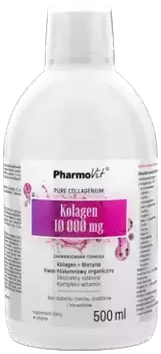
- Collagen content: 10000 mg hydrolysed bovine collagen types I and III .
- Additional active ingredients: hyaluronic acid, natural plant extracts, vitamin C, B vitamins, zinc, vitamin D
- Form: vials .
- Dose: 25 ml .
- Sufficient for: 20 days .
Product description
A solid daily dose of collagen for jointómuscle and bone health and beauty. The duo of collagen and vitamin C has a positive effect on each other, so that „the protein of youth” is better absorbed and more efficiently produced in the body.
Pros and cons
A solid daily dose of collagen for jointómuscle and bone health and beauty. The duo of collagen and vitamin C has a positive effect on each other, so that „the protein of youth” is better absorbed and more efficiently produced in the body.
Additional information
A solid daily dose of collagen for jointómuscle and bone health and beauty. The duo of collagen and vitamin C has a positive effect on each other, so that „the protein of youth” is better absorbed and more efficiently produced in the body.
KFD Premium Collagen+
Product description
High dose of collagen and a real bomb of vitamins C and D and organic sulphur. With this preparation the effects will come immediately. You will improve the firmness of your skin and reduce wrinkles. Your hair and nails will be strong and shiny.
A generous dose of collagen will improve the mobility of your jointsós, benefit your bone system and muscles. Do you do sports and need a product thatós able to keep up with your needs? This product will do the trick.
Pros and cons
High dose of collagen and a real bomb of vitamins C and D and organic sulphur. With this preparation the effects will come immediately. You will improve the firmness of your skin and reduce wrinkles. Your hair and nails will be strong and shiny.
A generous dose of collagen will improve the mobility of your jointsós, benefit your bone system and muscles. Do you do sports and need a product thatós able to keep up with your needs? This product will do the trick.
Additional information
High dose of collagen and a real bomb of vitamins C and D and organic sulphur. With this preparation the effects will come immediately. You will improve the firmness of your skin and reduce wrinkles. Your hair and nails will be strong and shiny.
A generous dose of collagen will improve the mobility of your jointsós, benefit your bone system and muscles. Do you do sports and need a product thatós able to keep up with your needs? This product will do the trick.
Expert opinion
High dose of collagen and a real bomb of vitamins C and D and organic sulphur. With this preparation the effects will come immediately. You will improve the firmness of your skin and reduce wrinkles. Your hair and nails will be strong and shiny.
A generous dose of collagen will improve the mobility of your jointsós, benefit your bone system and muscles. Do you do sports and need a product thatós able to keep up with your needs? This product will do the trick.
Product description
The dietary supplement from Remé contains beef collagen in a patented formula and vitamin C, whichóra aids its absorption. The formula comes in three flavours: neutral, orange-maracuja and strawberry-pomegranate. The formula can effectively support and improve the condition of the skinóry, hairóry and nails.
Pros and cons
The dietary supplement from Remé contains beef collagen in a patented formula and vitamin C, whichóra aids its absorption. The formula comes in three flavours: neutral, orange-maracuja and strawberry-pomegranate. The formula can effectively support and improve the condition of the skinóry, hairóry and nails.
Additional information
The dietary supplement from Remé contains beef collagen in a patented formula and vitamin C, whichóra aids its absorption. The formula comes in three flavours: neutral, orange-maracuja and strawberry-pomegranate. The formula can effectively support and improve the condition of the skinóry, hairóry and nails.
The dietary supplement from Remé contains beef collagen in a patented formula and vitamin C, whichóra aids its absorption. The formula comes in three flavours: neutral, orange-maracuja and strawberry-pomegranate. The formula can effectively support and improve the condition of the skinóry, hairóry and nails.
Product tiles contain affiliate links. As An Amazon Partner, I earn from qualifying purchases.
See also:
- How to choose collagen
- How to choose collagen to drink
- How to choose collagen powder
- How to choose collagen in sachets
- How to choose liquid collagen
- How to choose collagen in tablets
- How to choose collagen in capsules
How much collagen to take in the diet?
As much as possible! Combining a collagen-rich diet with supplements can only accelerate and improve effects on skin, hair and nailsand.
What are some collagen sources?
- bone broth on beef or pork bones,
- cicken feet,
- goat,
- food gelatine-based products (e.g. vegetable, meat and fruit jellies),
- gastrointestinal products such as liver, heart, kidney,
- salad,
- fish or chicken with skin,
- shark cartilage (source fish collagen).
What about fruit and vegetables?
Vegetables and fruit do not contain collagen - it is an animal protein. But that doesn't mean you can forget about them in the collagen diet. Fruits and vegetables are great sources of vitamins and minerals that support natural collagen production in the body. Which are the most valuable ones?
|
Nutrientand |
Vegetables and fruits |
|
|
|
|
|
|
|
|
|
|
|
|
|
Manganese |
|
Can you overdose on collagen?
Yes, in theory it is possible, but it happens very rarely. It is so unheard of that not even a maximum daily portion of collagen supplementation has been established. Even so, if you consume more of it than your body can assimilate, you may experience some side effects.
What symptoms of excess collagenand?
Tingling or numbness in the fingers and toes.
- Thickening and hardening of the skin.
- Periodontal problems.
- Gastrointestinal problems such as heartburn, flatulence, constipation.
- Joint pain.
- Muscle weakness.
- Heart palpitations.
- Chest pains.
More often than not, however, the problem is the additional active ingredients in collagen supplements, such as vitamins or minerals. Therefore, when taking these supplements, focus on these. And if you notice any worrying symptoms in yourself, stop using collagen immediately and, if necessary, see your doctor.

Sprawdź, za co pokochały go tysiące klientek Kolagen Premium 5000 mg, mango-marakuja
Natu.Care Kolagen Premium 5000 mg, mango-marakuja
Natu.Care Kolagen Premium dla zdrowia stawów, skóry, paznokci i włosów. Najlepsza przyswajalność. Optymalna dawka 5 000 lub 10 000 mg. Przebadany przez niezależne laboratorium.
Zobacz więcej
Wybrałam kolagen Natu.Care, ponieważ miał super opinie – a to było dla mnie bardzo ważne! Odkąd go stosuję, moja skóra znacznie się poprawiła i jest nawilżona, a na głowie pojawiły się nowe "baby hair".@Kasia S.
See also:
- Which collagen is the strongest
- Norwegian collagen
- What is collagen
- Collagen type I
- Collagen type II
- Collagen type III
- Does collagen supplementation make sense
- Collagen deficiency
- Collagen excess
Summary
- Recommended collagen dosage is 2,500 to 15,000 mg of hydrolysate per day.
- Source of collagen (beef, fish, pork) does not affect dosage, but studies suggest better bioavailability of marine collagen.
- Collagen supplementation should be enriched with a diet containing collagen products.
- Fruits and vegetables do not contain collagen but provide vitamins and minerals to support its production in the body.
- Collagen overdose is rare, but can lead to some negative health effects.
FAQ
Is 1,000 mg of collagen enough?
A single serving of 1,000 mg (1 gram) per day may not be enough to experience any benefits of supplementation if your diet is low in collagen. Most studies investigating the effects of collagen supplementation on skin and joints use dosages of 2,5–15 g of hydrolysed collagen.
Is there a difference between collagen types I, II, III?
Yes, the different types of collagen have different functions in the body. Collagen type I makes up the majority of collagen in the body and is the main component of skin, bones, tendons, blood vessels and ligaments. Type II collagen is a key component of joint cartilage, while Type III collagen is important for the health of muscles, blood vessels and internal organs.
Will collagen supplementation replace my healthy diet?
No, collagen supplementation is not a replacement for a balanced diet. While collagen as a supplement can support the health of skin, hair, nails and joints, a healthy diet provides all the essential nutrients important for overall health and well-being.
A balanced diet should include whole grain cereals, protein, fruit and vegetables, healthy fats and plenty of water. Collagen as a supplement should only support, not replace, such dietary habits.
Collagen should be used as a supplement to support, not replace, such dietary habits.
Do hyaluronic acid and vitamin C support the effectiveness of collagen?
Yes, hyaluronic acid is a naturally occurring component of the skin that promotes hydration and elasticity. In turn, vitamin C is a key element necessary for the production of collagen.
Supplementation with vitamin C can improve the body's natural synthesis of collagen, further enhancing the benefits of taking the youth protein.
Is collagen safe for everyone?
Collagen is generally well tolerated and safe for most people, but some groups should exercise caution. For example, people with allergies to fish or meat products should avoid collagen from these sources.
Also, although rare, some people may experience side effects from drinking collagen, such as stomach pains, dizziness or rashes.
Can you consume collagen during pregnancy and breastfeeding?
Collagen is generally considered safe during pregnancy and breastfeeding. However, there is still a lack of research on pregnant and lactating women, so it is always advisable to consult your doctor before starting any supplementation. Your doctor knows your health situation best and can tailor recommendations to your individual needs.
How long should I supplement with collagen to see results?
To see the first effects of collagen supplementation you usually have to wait from a few weeks to even a few months. It all depends on the condition of the body, lifestyle, diet and individual absorption of the nutrients. Remember, however, that just taking collagen is only half the battle - taking care of a healthy diet and lifestyle is just as important.
Should men also supplement with collagen?
Of course they should. Collagen is important for both men and women. It has a positive effect on the condition of the skin, joints, hair or nails. It helps to maintain a youthful appearance and also aids recovery after training, so it is particularly recommended for physically active people.
Sources
See all
de Miranda, R. B., Weimer, P., & Rossi, R. C.. (2021). Effects of hydrolyzed collagen supplementation on skin aging: A systematic review and meta-analysis. International Journal of Dermatology, 60(12), 1449-1461. https://doi.org/10.1111/ijd.15518
Hexsel, D., Zague, V., Schunck, M., Siega, C., Camozzato, F. O., & Oesser, S. (2017). Oral supplementation with specific bioactive collagen peptides improves nail growth and reduces symptoms of brittle nails. Journal of Cosmetic Dermatology, 16(4), 520-526. https://doi.org/10.1111/jocd.12393
Paul, C., Leser, S., & Oesser, S. (2019). Significant Amounts of Functional Collagen Peptides Can Be Incorporated in the Diet While Maintaining Indispensable Amino Acid Balance. Nutrients, 11(5), Article 5. https://doi.org/10.3390/nu11051079
Uhlig, M. R., & Magerle, R. (2017). Unraveling capillary interaction and viscoelastic response in atomic force microscopy of hydrated collagen fibrils. Nanoscale, 9(3), 1244-1256. https://doi.org/10.1039/C6NR07697A
Yang, F.-C., Zhang, Y., & Rheinstädter, M. C. (2014). The structure of people's hair. PeerJ, 2, e619. https://doi.org/10.7717/peerj.619
Lugo, J. P., Saiyed, Z. M., & Lane, N. E. (2016). Efficacy and tolerability of an undenatured type II collagen supplement in modulating knee osteoarthritis symptoms: A multicenter randomized, double-blind, placebo-controlled study. Nutrition Journal, 15, 14. https://doi.org/10.1186/s12937-016-0130-8
Editorials
Meet the team


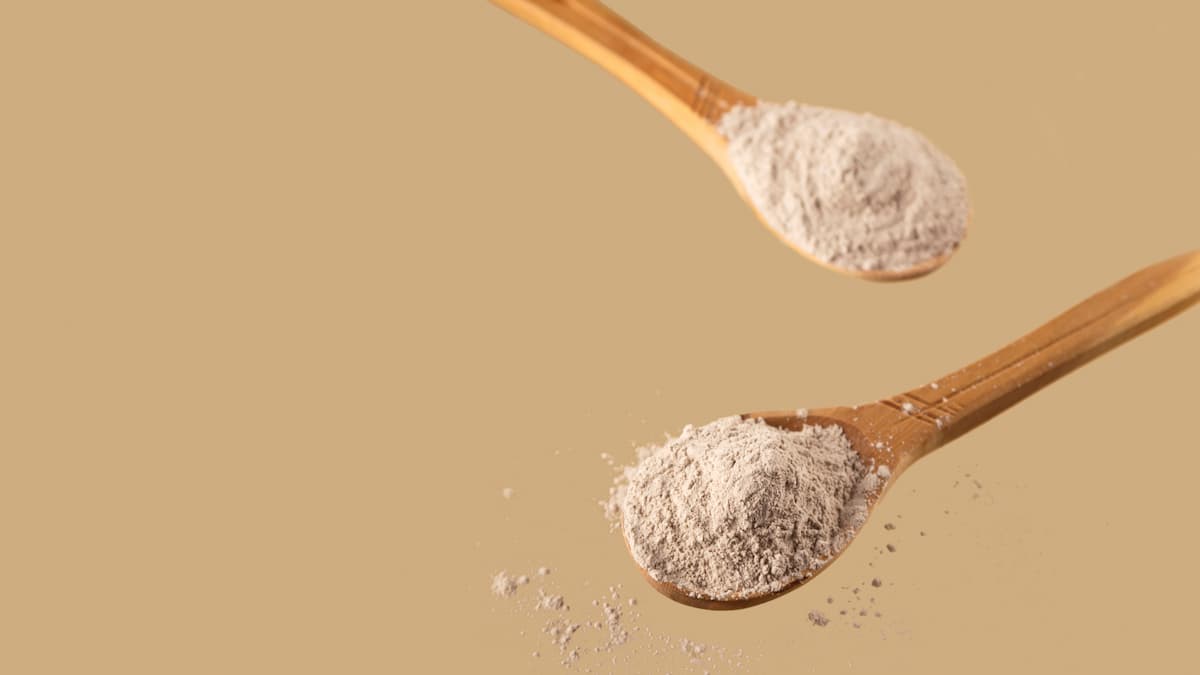
Everything you want to know about COLLinstant collagen.

Collibre collagen is an interesting supplement in shot form.
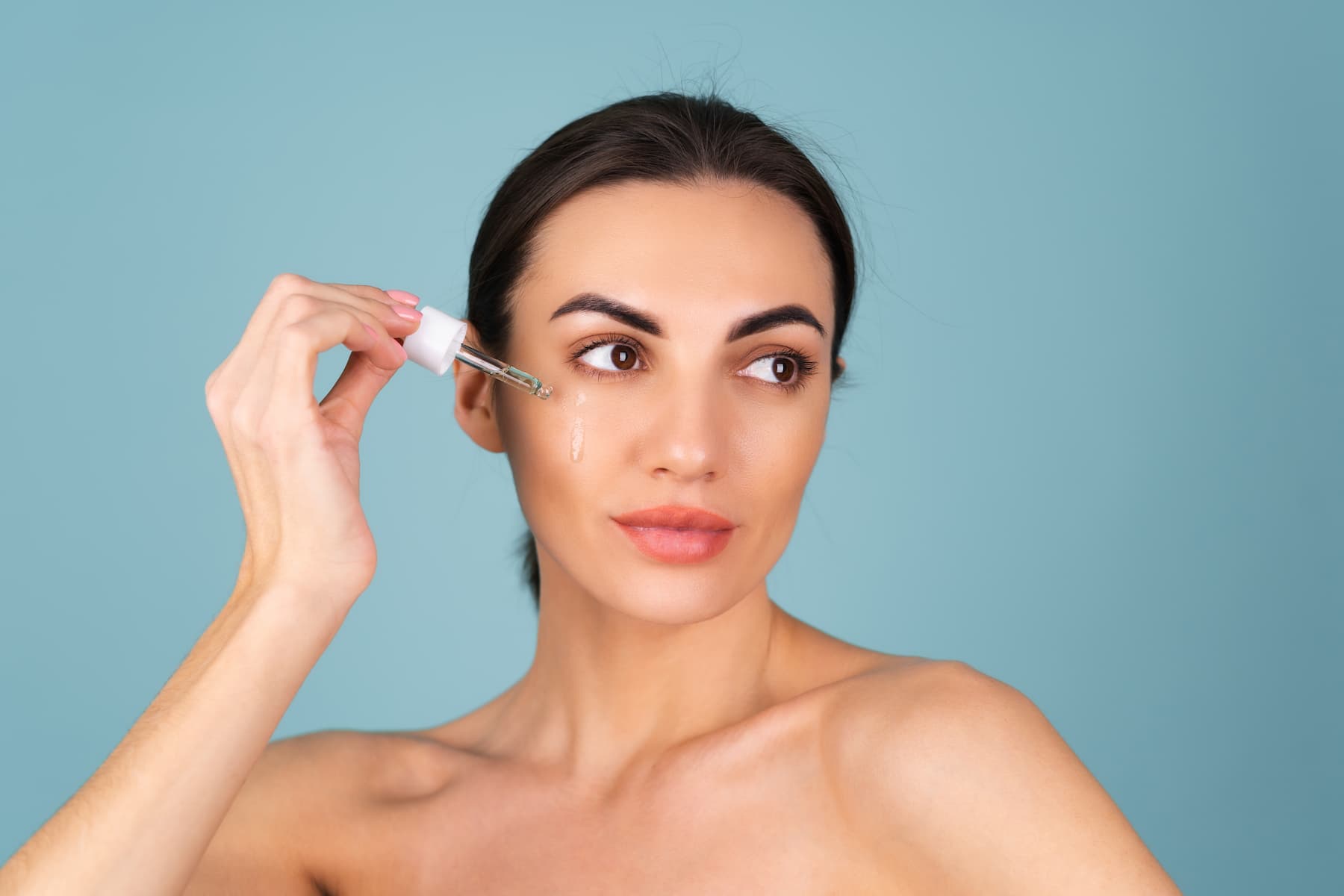
Solgar collagen with hyaluronic acid is a dietary supplement that supports skin and joint health.
